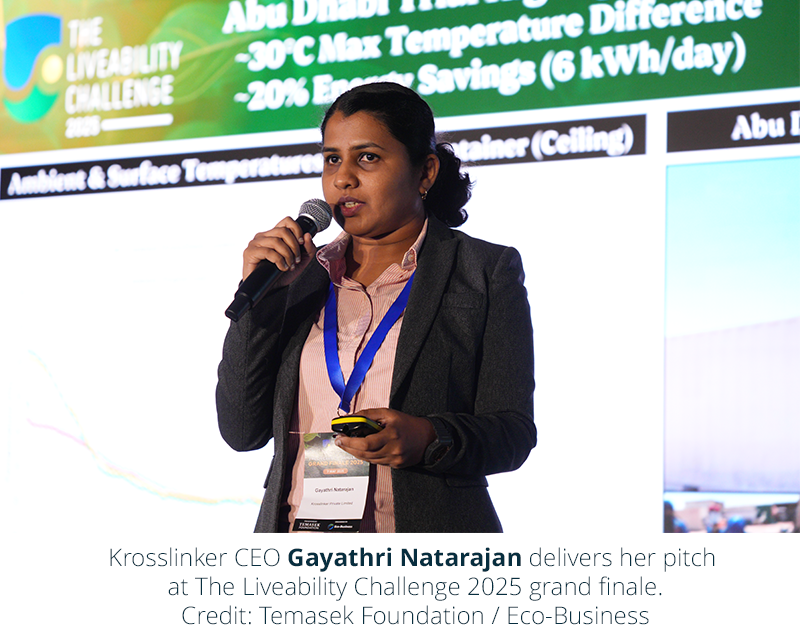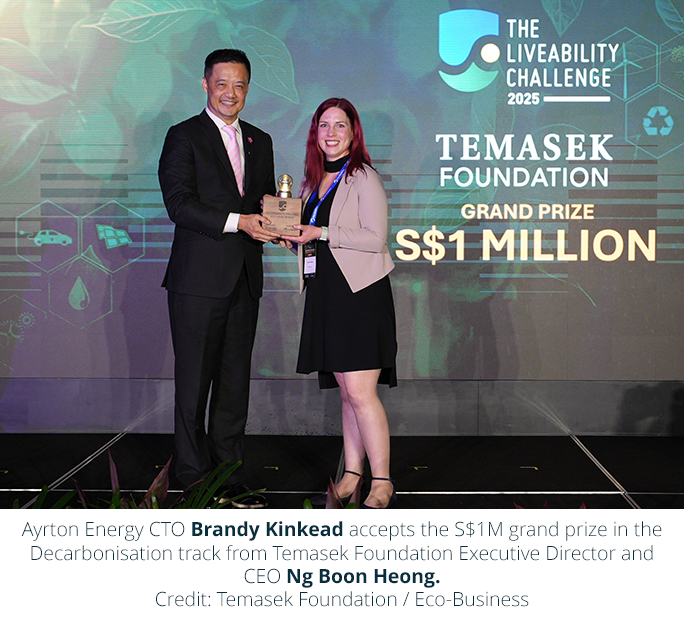Hydrogen Storage and Thermal Insulation Start-ups Win Asia Liveability Challenge
Innovators working on passive cooling and hydrogen storage technologies took the top two available prizes at the 2025 edition of The Liveability Challenge, a climate tech competition presented by Singaporean nonprofit Temasek Foundation and organized by ESG-focused publication Eco-Business.
Cleantech Group was an official partner of both the Challenge and its parent event Ecosperity Week, the annual sustainability summit convened by Singapore state investor Temasek. I mentored innovator teams in the run-up to their live pitches at the grand finale, alongside my fellow e-coaches Carlo Chen-Delantar, Head of ESG and Circular Economy, Gobi Partners; Kim Demeyer, Science & Technology Officer, Flanders Investment & Trade; Khairu Rejal, Principal, Southeast Asia, Investible; and Augustine Anthuvan, Executive Producer, Eco-Business.
The Challenge featured eight finalists competing across two tracks, each of which offered a S$1M top prize:
- ‘Cool Earth’ – solutions to tackle climate change-induced extreme heat
_ - ‘Decarbonisation’ – scalable solutions to reduce industrial carbon emissions
Aerogels for Cold Chain
Singapore’s Krosslinker won in the ‘Cool Earth’ category. It has developed a super-insulating aerogel nanomaterial that can reduce ambient temperatures by up to 5°C, and surface temperatures by up to 10°C.
As an initial application for its technology – which saw it listed in Cleantech Group’s 2023 APAC Cleantech 2025 – Krosslinker is offering its aerogels as packaging for keeping biological products at optimal temperatures without conventional refrigeration.
“We are very happy and excited [to have won], but this is just the beginning. We have a very big job to do to make sure that we develop solutions that equitably reach everybody and not just the tech-savvy community,” said Krosslinker co-founder and CEO Gayathri Natarajan.

Liquid Hydrogen Carriers
Canadian company Ayrton Energy took home the top prize in the ‘Decarbonisation’ track. Ayrton Energy – a Cleantech Group Cleantech 50 To Watch awardee in 2024 – has developed a reusable liquid hydrogen carrier system that enables the storage and transportation of hydrogen using existing fuel logistics infrastructure.
“We’re really excited to be able to have this funding support and cement our position in Singapore and Southeast Asia,” said co-founder and CTO Brandy Kinkead.

Ayrton Energy additionally secured two S$100,000 investments from Liveability Challenge strategic partners TRIREC and Valuence Ventures, while Krosslinker received S$100,000 from OCTAVE Well-being Economy Fund to develop urban cooling solutions using its aerogel tech as a coating and in paints.
Hybrid CCUS
A third finalist, Australia’s CO2Tech, received S$100,000 from Enterprise Singapore to further develop its hybrid carbon capture and storage (CCUS) solution which combines solvent absorption and membrane separation.
The five other finalists were:
- CatAmmon (Israel) – developer of a ceramic catalyst that substantially reduces the required temperature for ammonia cracking
_ - Cetogenix (New Zealand) – using a hydrothermal oxidation process to transform organic waste into biogas, biomaterials, and other valuable products
_ - D-CRBN (Belgium) – developer of technology that converts industrial carbon dioxide emissions into carbon monoxide for use as a feedstock
_ - Eztia (U.S.) – creator of body-cooling wearables that can reduce skin temperature by up to 10°C
_ - SXD (U.S.) – AI platform that optimizes material usage in textile manufacturing
“We believe in the urgency of supporting bold and deep-tech innovative solutions that can drive real progress in decarbonizing our planet and keeping our environment cool,” said Heng Li Lang, Head of Climate & Liveability at Temasek Foundation. “Our catalytic funding reflects this important commitment.”
Heng added that beyond The Liveability Challenge, Temasek Foundation is growing its network of climate tech competitions across the Asia-Pacific region into China, Indonesia, and Vietnam.
“By doing so, we aim to accelerate innovators’ paths to commercialization and deliver real impact for both the people and the planet,” she added.


